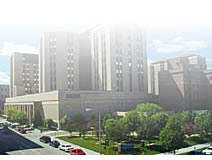 |
||||||||||
Date: July 13, 2025
by Timothy G. Call, MD
Division of Hematology
Mayo Clinic, Rochester, MN
Related Article:
Not the Worst Day of Your Life
Editor's Note: Dr. Tim Call is a hematologist/oncologist at Mayo Clinic, Rochester, MN and an Assistant Professor of Medicine at the Mayo Clinic College of Medicine. He has done much important work in the area of familial CLL and lymphoma, and is responsible for developing a database at Mayo Clinic on the familial incidence of B-cell malignancies including CLL, B-cell lymphomas and a few related diseases. You might recall his name as an author on the Mayo Best Practices article - Current Approach to Diagnosis and Management of CLL. More details are provided in his official Mayo Clinic profile. We are pleased that he has written this article addressed to the patient community. We strongly encourage that our readers register in one of the recommended databases when appropriate.
There is a rapidly increasing interest among patients and at academic medical centers in the topic of familial CLL and other lymphoproliferative disorders (LPD’s) such as Non-Hodgkin’s lymphoma, Hodgkin’s disease, hairy cell leukemia, etc. Five to ten years ago the literature contained a few scattered case reports of isolated families and most clinicians were not aware of a potential familial link in CLL or LPD’s. The following information provides some answers and identifies some advances regarding this issue. Hopefully, more answers will emerge from the cooperative efforts of patients, clinicians, geneticists and epidemiologists.
If you are the only person in your family who has known CLL, there probably is nothing further that needs to be done. Your family members need to continue with routine medical and preventive health care. They should inform their physician of a CLL case in the family, so their family history section of the medical record will include it. They certainly may request that a CBC (complete blood count) be performed at their next check-up or if they have similar symptoms to yours.
If in your family there are at least 2 close relatives (parent, sibling, child, aunt or uncle, or 1st cousin) that have either CLL or another lymphoproliferative disease (such as non-Hodgkin’s lymphoma, Hodgkin’s disease and hairy cell leukemia), then other members of your family may have a higher risk of CLL or a LPD. However, it is still likely that most members of your family will still not develop CLL, as CLL is an uncommon disease.
If this is the case, you may wish to consider the following:
There is active research in the area of familial CLL/LPD.
The study of familial CLL or LPD’s is gaining momentum, but continues to be in an early stage. Although there are a number of chromosomal abnormalities associated with it, a specific genetic cause has yet to be identified. Therefore the most important thing now is identifying and collecting blood for special genetic analysis on as many CLL families as possible. At this stage, the studies are focusing on this task and then as the story unfolds hopefully candidate genes can be identified. These genes could provide answers as to causation and potential targets for future therapies. Although these studies may provide periodic updates and will publish their results in the medical literature, it is unlikely that they will provide individualized reports back to families.
Working with the CLL patient community, we hope that in the future we can develop methods of early identification of individuals at high risk of CLL and develop strategies for prevention and more non-toxic treatment.
Editor's Note: You may be interested in two additional documents related to familial CLL. These documents are in pdf format. Clicking on the links will load them into the Adobe Reader plug-in for your browser.
Familial LPD Patient Information;
Referral Physician Information - Familial LPD.
 Enter Keywords: |
———
Disclaimer: The content of this website is intended for information only and is NOT meant to be medical advice. Please be sure to consult and follow the advice of your doctors on all medical matters.
Copyright Notice:
Copyright © 2025-2007 CLL Topics, Inc. All Rights Reserved.
All materials contained on this site are protected by United States copyright law and may not be reproduced, distributed, transmitted, displayed, published or broadcast without the prior written permission of CLL Topics, Inc. You may not alter or remove any trademark, copyright or other notice from copies of the content.
However, you may download and print material from CLLTopics.org exclusively for your personal, noncommercial use.
———
